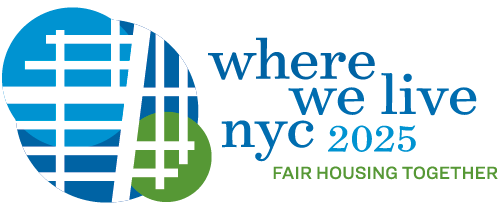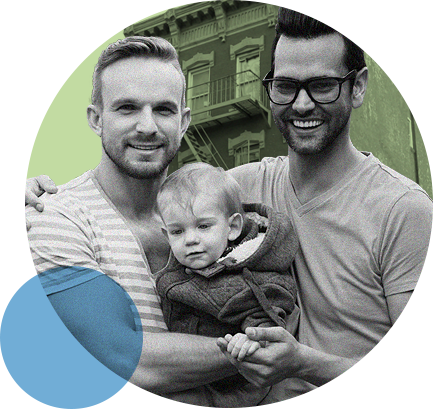The City has dedicated substantial resources to combat housing discrimination, focusing on both preventative measures and enforcement. A cornerstone of these efforts has been the work of the New York City Commission on Human Rights (CCHR). Since the implementation of WWL2020, CCHR has conducted over 900 tests for discrimination by housing providers, including landlords and brokers. In addition to testing and litigation, the City has emphasized proactive case resolution through pre-complaint interventions and educational initiatives. CCHR’s pre-complaint interventions not only expedite justice but also promote community trust and incentivizes compliance with fair housing laws. Following a 2023 pilot, which confirmed findings of widespread source of income (SOI) discrimination, the City will be combining its emphasis on proactive case resolution with deeper investment in paired testing.
–Ridgewood Library respondent
Rising housing scarcity and federal cuts to fair housing enforcement make it easier for landlords to discriminate and harder for tenants to challenge it
Unfortunately, our increasingly tight housing market makes housing discrimination harder to battle. The city’s housing vacancy rate has plummeted, dropping from a high of 4.54% in 2021 to 1.4% in 2023.
Figure 5.1: Net rental vacancy rate by asking rent, 2023*

Source: NYC Housing and Vacancy Survey, 2023
Limited vacancy can intensify discriminatory practices as landlords and property managers more discretion in tenant selection and they may be more inclined to select or reject applicants based on race, ethnicity, disability or income source. These dynamics not only harm the prospective tenants but can reinforce existing patterns of segregation. Because vacancy rates are lowest for the lowest-cost homes, the households with the fewest options in the market will face the greatest pressures. Moreover, during the City’s engagement work, New Yorkers described suspicions of discriminatory behavior in the application process for purchasing a co-op, but the opaque approval process makes it extremely difficult for applicants to prove discrimination.
Cuts to federal programs that protect against housing discrimination and enforce housing discrimination laws, and reductions in HUD staff, will also complicate national and local responses to housing discrimination.
The City will continue to invest in testing, enforcement and data collection and to use findings from these efforts to shape policy
Discrimination today often evades easy detection and can present as more covert even though widespread.
As part of the 2023 source of income (SOI) discrimination pilot, for example, the Housing Rights Initiative (HRI) found among conclusive tests:
- 32% identified SOI discrimination
- 65% resulted in rental assistance acceptance
- Evidence of SOI discrimination was identified in every borough
The findings included a mix of forms of discrimination ranging from implicit to explicit:
- Income/credit/employment status asked for or required: 44.1% of rejections.
- Claimed exemption from rental assistance program (i.e., this is a co-op building): 41.2% or rejections.
- Not appearing at scheduled showings or “ghosting”: 20.6% of rejections.
- Outright rejection (i.e., we do not accept vouchers): 17.6% of rejections.
The City is committed to continually strengthening its data collection and data protection systems, which will help root out discrimination. In WWL2025, the City is renewing its efforts to eliminate two of the most persistent forms of housing discrimination: disability discrimination and SOI discrimination. Building on past WWL2020 goals, tackling discrimination will include expanding testing and using the collected data to identify hotspots of discrimination, inform targeted interventions, and develop comprehensive policies. HPD is contracting with two providers: HRI and the Fair Housing Justice Center (FHJC). The two organizations will use different approaches to this work, expanding our reach and impact. Both organizations will receive $1,155,00 each over three years and are expected to have begun work across all five boroughs in 2025.
The Fair Chance for Housing Law protects returning citizens by limiting the use of criminal history in rental decisions
As of 2021, there are roughly 817,000 people in New York City with criminal conviction records, a number that disproportionately affects Black and Brown communities. Research has consistently shown that individuals with arrests and criminal histories face significant barriers in securing housing, often due to discriminatory practices and policies and stigma. Roughly 43% of those released from State prisons to New York City enter shelters directly, highlighting a link between homelessness and justice involvement. To help address these challenges, the City Council passed Local Law 24 of 2024, the Fair Chance for Housing Law, barring landlords from inquiring about arrests, and limiting the timing and scope of inquiries into criminal history until after an initial application review. This law aims to give individuals impacted by the criminal legal system a fairer chance at stable housing. People with criminal records are at increased risk of recidivism without stable housing. By reducing these barriers, the City is supporting reintegration and working to reduce repeat offenses.
Because education and awareness are critical to the success of anti-discrimination laws, the City will fund a far-reaching public awareness campaign to make sure impacted New Yorkers know their rights.
The City will work to prioritize the New Yorkers who face disproportionate risk in the housing market for new housing
In WWL2020, the City also committed to creating better access to publicly-supported housing for more New Yorkers. There are many more New Yorkers in need and many more who apply for affordable housing than we can serve. In FY25 alone, HPD marketed over 16,000 units on Housing Connect and received over 7 million applications for these units. This means that for every unit marketed on Housing Connect in that one year, there were roughly 443 applicants. With demand for affordable housing outpacing supply, many New Yorkers struggle to find low-cost housing and end up having to pay more just to live in the City. According to the 2023 NYC Housing and Vacancy Survey (NYCHVS), renter households earning less than $70,000(the median renter household income) pay 54% of their income toward rent, meaning they are severely rent burdened. The City’s current affordable housing lottery is based on income eligibility. Based on the findings of the Accessibility Program for Older Adults pilot, which is a response to the high number of older adults living in inaccessible housing, HPD will continue to explore other ways to identify and best target New Yorkers most in need of affordable housing.


